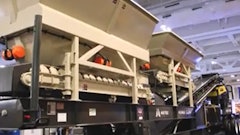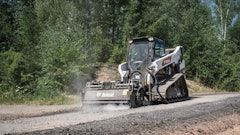
By Ryan Alleman, vice president, Lehigh Technologies
Modified asphalt is a critical piece of our national transportation infrastructure. Why? Because it improves the durability of our most heavily travelled roadways, keeping them smooth and safe for as long as possible.
Modified asphalt typically include additives in the binder, or the glue that holds the aggregate rocks together. These modifiers enable the binder to maintain flexibility over a broader temperature range, which means that the asphalt is better able to handle extreme temperatures without cracking or rutting.
Modifying asphalt binders can be accomplished in many ways, and is no simple task. It takes knowledge, capital for specialized equipment, collaboration and coordination between many entities to make it happen.
Access to several large-volume and commercially viable modifying materials is also critical, because civil projects are huge endeavors and require a reliable supply chain.
Binder modification began with synthetic polymers, which are based on oil production and synthesis. As a result, prices and supply match the ongoing volatility of the oil market.
In recent years, a great deal of scientific study has gone into understanding the use of tire rubber powder for modification. More than half of the states either use or are testing rubber-modified asphalts today.
Not subject to oil prices
Already, advanced specialty chemicals such as Micronized Rubber Powder (MRP) are delivering top-end performance properties to asphalt binders and are in wide deployment in the field. The beauty of modifying asphalts with MRP is that they are independent of oil supply and pricing volatility.
Even with today’s historically low cost of oil, Rubber Modified Asphalt (RMA), which includes MRP and is produced to meet the most stringent Department of Transportation (DOT) specifications, still offers notable cost savings over traditional polymer modified asphalt.
MRP use also decreases the country’s dependence on oil imports, and supports local jobs and markets because most polymers used in road modification are produced outside of the United States.
MRP is also the most environmentally friendly modification choice available, since it is derived from a surplus of end-of-life tire rubber. Each year over 250 million end-of-life tires are generated in the United States, leaving approximately 6 billion pounds of accessible raw material – more than enough to modify every road in the U.S.
Constant improvements
Scientists are constantly developing new ideas and chemistries to improve RMA technology. One example is a movement toward hybrid systems, which add MRP and polymers or additives such as Rheopave XP10 to obtain maximum property, workability, sustainability and cost reduction benefits.
These hybrid binders already meet emerging agency requirements, such as improved elastomeric properties. For example, Florida’s DOT was the first to develop a specification based on a hybrid system and proved the success of a modified binder by combining Rheopave XP10 + MRP. Since then, several other states have upgraded their modified asphalt specifications to allow hybrid systems to be a direct alternative to polymer modified binders.
Each year, more and more vehicles travel on our roads. Hundreds of millions of Americans rely on road safety and the ability to reach their destination quickly and comfortably. To ensure the ongoing reliability of the greatest transportation network ever created, it’s critical that we invest in technologies and materials that help us build better roads that cost less, last longer, require less maintenance and have minimal environmental impact. Environmentally sound, high-performing specialty chemicals, such as MRP, can do just that.
Lehigh Technologies is a specialty chemicals company that produces high-performance micronized rubber powders (MRP).

























